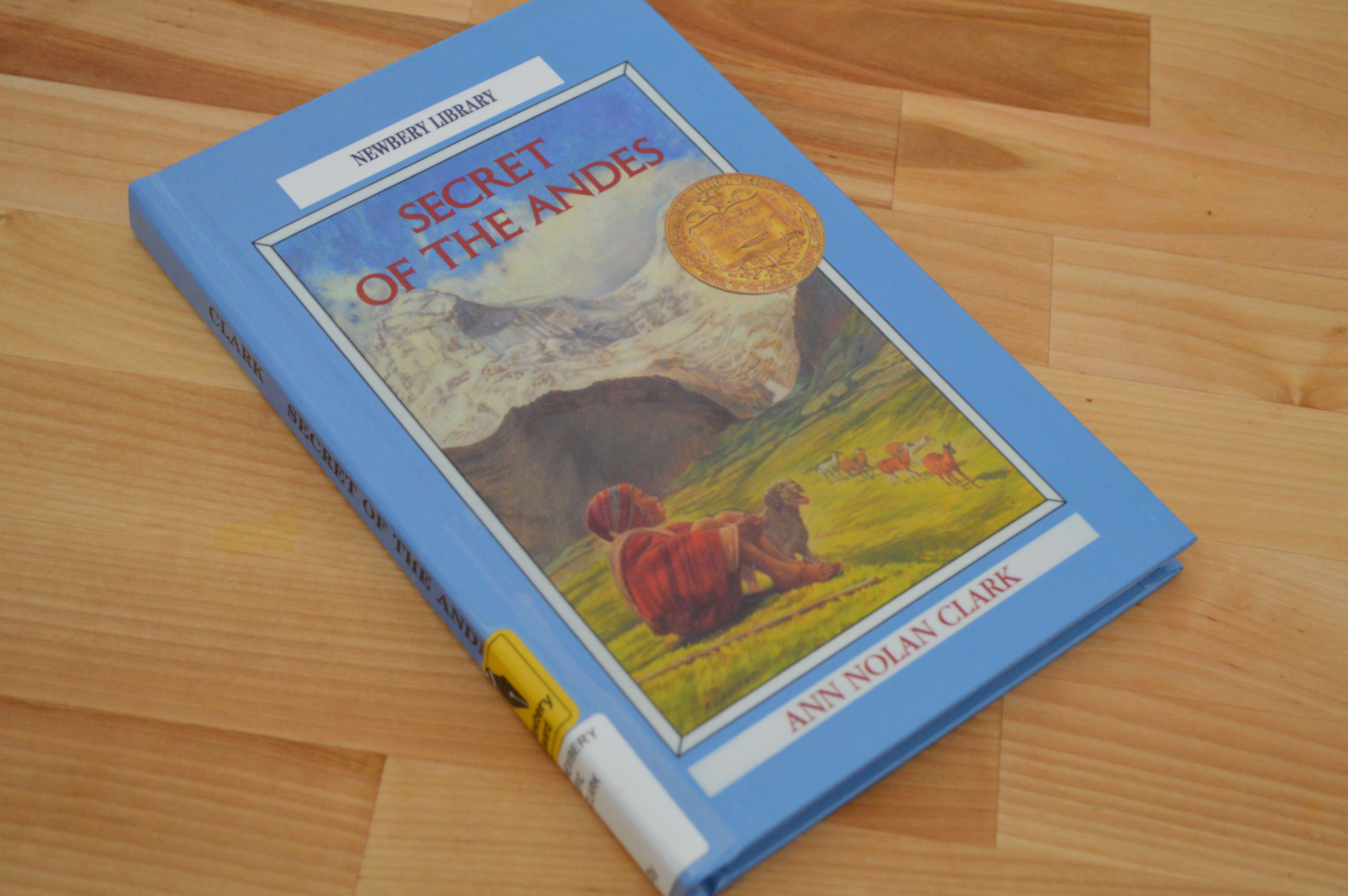
The 1953 Newbery Award winning book, Secret of the Andes by Ann Nolan Clark, follows a young indigenous Peruvian llama shepherd, Cusi, as he seeks to discover why he has been raised by a mysterious old wise man, Chuto, in an isolated Andean valley. Cusi and his companion, Misti the llama, travel first to the sea and then alone to the ancient city, Cuzco, to find the answers at which Chuto has only hinted.

What I liked. The whole book is written in a very poetic voice with beautiful lines and descriptions popping up amid the very mature sounding musings of little Cusi. For example, when Cusi and Chuto come to stay the night with some of Chuto’s friends, the women “laughed behind their hands, but Cusi knew that was their way. No one had told him, but he understood that a welcome does not need to be expressed by words or gestures. If the heart speaks to the stranger, the stranger feels at home.” (p. 38)

What was interesting. I thought that the actual “secret” and reason that Cusi was raised by Chuto was a compelling one that was consistent with the tone of the book. I was a little surprised because as the book was drawing to a close I couldn’t really guess what exactly could wrap up the story in only a few pages, but it did. (No, I’m not going to tell you what it is! You have to read it for yourself!!)

What were some limitations. I’m not entirely sure this is a limitation, but Secret of the Andes won the Newbery the year that EB White’s Charlotte’s Web only won a Newbery Honor. Children’s literary critic Anita Silvery in her 2008 School Library Journal article wrote about the 1953 Newbery year: “A member of the 1953 Newbery committee, which chose The Secret of the Andes (Viking, 1952) over E. B. White’s masterpiece, Charlotte’s Web (Harper, 1952), confessed that she preferred the former because she hadn’t seen any good books about South America…[and Silvery concludes] But I know that the good is often the enemy of the best. The Secret of the Andes is a good book; Charlotte’s Web, the best. Recent Newbery committees seem to be hunting for the former—when they should be desperately searching for the latter.” The insinuation is that the books in the early 2000s that won the Newbery did so because they were a bit more about filling a multicultural curriculum requirement for elementary school reading than because they were the very best books that children would love. And I think that to some extent the challenge of any book award is that you can’t really compare and rank books very objectively. I think that I too would prefer to read and recommend Charlotte’s Web over Secret of the Andes, but after reading the first 32 Newberies, I agree with the unnamed committee member that (at least among Newbery winners) South American set children’s books were thin on the ground. And the first decade of Newbery winners had some distinctly racist sentiments, which I think could be balanced out with some books that have protagonists that are from different cultures and backgrounds. Although of course at the same time, a lot of the early Newberies were multicultural; it’s just that they were also exoticized. I’m not an expert on Peruvian indigenous culture to speak with any authority about whether Secrets of the Andes is a particularly faithful rendering of Incan llama herding descendants, but to me it seemed that Ann Nolan Clark did a fair bit of research in creating Cusi and his world.

Similarity to other Newbery winners. Tales from the Silverlands is a (uneven) collection of South American Folktales, while Call it Courage and Waterless Mountain are two coming of age stories of indigenous boys (one in Polynesia and one in Arizona) — so there were other Newberies that touched on some of the themes and settings of Secret of the Andes.

What it teaches me as a writer. I suppose the real lesson of thinking about Charlotte’s Web and Secret of the Andes together is that awards, like the Newbery, are helpful, but ultimately incredibly limited. Just like one star reviews of Harry Potter remind me, not everyone loves the books I love. And not everyone is going to love my book—even if it’s quite good (and I hope it will be!). Literary taste is subjective; sometimes we read books at the wrong time, or we read books that normally wouldn’t speak to us at the exact time they unexpectedly do. Really, I think that a good book recommendation is probably more valuable than a book award, although I am sure that the award givers hope that they can at times be one and the same.

Have you read Secrets of the Andes? What are your favorite award winning or NOT award winning books? And do you think that subject matter should influence literary awards?
*Note* This post contains Amazon affiliate links, which means if you were to buy a book, I’d get a tiny commission at no cost to you. Thanks for supporting Stories & Thyme!*
